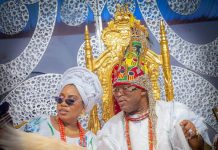Ugandans lined up to vote in a tense election Thursday under heavy security and an internet blackout as veteran leader Yoweri Museveni seeks a sixth term against a former pop star half his age.
The internet went down on the eve of the vote, with some parts of the country reporting complete disruptions or significant slowdowns, after one of the most violent campaigns in years.
Museveni is seeking a sixth term in office, having ruled for almost four decades, against singer-turned-MP Bobi Wine, 38, whose popularity among a youthful population has rattled the former rebel leader.
READ: Why #WeAreRemovingADictator is trending
Wine, whose real name is Robert Kyagulanyi, said several of his party’s polling agents had been arrested during the morning, as he cast his vote alongside his wife Barbie, to a crowd of dancing and singing supporters.
“In 22 districts out teams are on the run because they are being surrounded and pursued by police and soldiers as if they are criminals,” he said.
In Kampala’s Kamwokya slum, where Wine grew up and is hugely popular, voters streamed to a polling station as police enforced social distancing after weeks of surging coronavirus cases in the East African nation.
A group of about two dozen riot officers marched past, with heavy military and police presence in other parts of the capital.
“I am here to change the leadership of this nation because for years they’ve been telling me they will secure my future. They have not done that,” said driver Joseph Nsuduga, 30, one of the first in line to vote.
Some 18 million voters are registered for the presidential and parliamentary vote, and results are expected by Saturday.
“We know that Ugandans have turned out in large numbers to cast their vote. I continue to encourage all Ugandans to turn out and vote,” Wine said.
He has vowed non-violent street protests should Ugandans feel the election was stolen, and urged them this week to “stay and protect your vote”, using their phone cameras.
Museveni has warned that using violence to protest the result would amount to “treason”.
He has ruled Uganda without pause since seizing control in 1986, when he helped to end years of tyranny under Idi Amin.
Once hailed for his commitment to good governance, the former rebel leader has crushed any opposition and tweaked the constitution to allow himself to run again and again.
The run-up to polling day was marred by a sustained crackdown on Museveni’s rivals and government critics, and unprecedented attacks on the nation’s media and human rights defenders.
In November, at least 54 people were shot dead by security forces loyal to Museveni during protests against one of Wine’s numerous arrests.
The US, EU, UN and global rights and democracy groups have raised concerns about the integrity and transparency of the election.
Only one foreign organisation, the African Union (AU), has sent monitors, along with an AU women’s group.
On Wednesday, the United States, a major aid donor to Uganda, announced it was cancelling a diplomatic observer mission after too many of its staff were denied permission to monitor the election.
In a statement, US ambassador Natalie Brown warned the refusal meant the election “will lack the accountability, transparency and confidence” brought by independent oversight.
On Tuesday, Museveni announced the suspension of social media networks and messaging services like Instagram, Twitter and WhatsApp in response to Facebook closing accounts linked to government officials the tech giant said were spreading misinformation.




